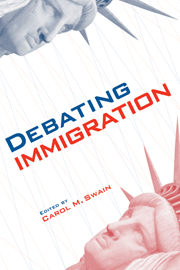18 - Concluding Observations
Published online by Cambridge University Press: 05 June 2012
Summary
Not much has changed in immigration thinking since I edited Clamor at the Gates more than 25 years ago. During this period, we have been living through the most recent – and by now the most extended – wave of immigration in U.S. history. We have had some excellent research, particularly on the economic effects of recent immigration – although, to be sure, we do not all agree on the conclusions of this research. We have also had a good deal of research, by its nature more difficult to conduct, on the various dimensions of the assimilation and integration of immigrants into American society, and the conclusions of this research are also disputed. We have had extended debate and a good deal of legislation on what is universally considered the most serious issue in current immigration, the huge scale of illegal or undocumented immigration. But as we struggle with this issue in the first decade of the 21st century – just as we struggled with it in the 1980s and 1990s – it is clear that we have come to no generally accepted and politically realizable conclusions as to what, if anything, can and should be done.
This volume on the politics of the contemporary immigration debate tells us some familiar things about current immigration and brings to our attention some of the recent research, particularly on immigration's economic effects, but its true value lies in the new questions it raises.
- Type
- Chapter
- Information
- Debating Immigration , pp. 257 - 268Publisher: Cambridge University PressPrint publication year: 2007
- 2
- Cited by

